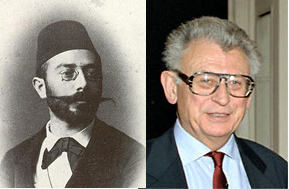
Eduard Glaser (1855-1908), left; Walter Dostal (1928-2011), right
[In early August the academic community lost one of the pioneers of ethnographic study on the Arabian Peninsula, the distinguished Austrian scholar Walter Dostal. Here is the obituary from the Austrian Academy of Sciences website.]
With Walter Dostal’s passing away in Vienna on August 6th/7th 2011, the anthropological communities in Austria, Central Europe and the German-speaking countries lose one of their best-known representatives shaping the field throughout the latter quarter of the 20th century.
Dostal was best known for his ethnographic studies of Arabian and Middle Eastern societies, but he also contributed substantially to anthropological theory – with particular emphasis on the interplay between environment, society, and history. As a leading expert for the Arab peninsula at this Academy, Dostal continued a remarkable research record into the early 21st century which at the Academy of Sciences goes back to the late 19th century.
Dostal had belonged to the first generation of anthropology students trained after the second world war, and his scholarly work was committed to build a new and internationally oriented foundation for the discipline once called “Völkerkunde” in the German-speaking countries after 1945. Born on May 15th 1928 in Grulich near Brno (today: Czech Republic), Dostal and his family moved at the end of the war to Vienna where he began his studies in anthropology. His critical engagement with the so-called “Culture Circles” theory led him to reject any speculative historical models, and to appreciate the empirical archaeological and textual evidence. Formative influences during those early years of his career were Robert Heine-Geldern (a corresponding member of the AAS) and Joseph Henninger. After his dissertation on Semitic-speaking peoples he began a first sequence of ethnographic fieldwork in the Arab peninsula, which he combined with international research sojourns in Frankfurt and Rome, and his first position as Curator for the Middle Eastern section at Vienna’s Ethnology Museum.
With his early field work in Kuwait (in the late 1950’s) and in southern Yemen (during the early 1960’s) Dostal in fact became the world’s first trained socio-cultural anthropologist who carried out ethnographic fieldwork in the Arab peninsula. His book-volume habilitation on the Bedouins in Southern Arabia established his international reputation and included a theory on camel riding techniques, and their significance for the evolution of camel raising in Arabia. In the very last academic lecture Dostal gave in October 2010 at the ISA-hosted international workshop “Camels in Asia and North Africa: Their significance in past and present”, Dostal returned again to this topic and to a critical re-assessment.
In the mid-1960’s, Dostal was invited to become the first chair at the newly-founded seminar for ethnology in Switzerland’s capital Berne, which he helped to build up, and that he led for a decade. During those years, he continued his ethnographic field work with several intense campaigns in northern Yemen, which resulted in his book on the market of San’a and in several articles on tribal organization. Simultaneoulsy, Dostal also produced a dense ouevre of ethnographic documentary films on Southern Arabia. At the same time, Dostal began to elaborate his theoretical insights on the impact of ecological factors upon the socio-cultural organization of humans. As Dean at Berne University, Dostal also engaged anthropology with new issues such as indigenous rights among native ethnic groups in the Americas, and he was among the first male scholars in German-speaking anthropology to publish on gender topics. The late 1960’s thus brought Dostal into even closer contact with new international developments in this field and beyond.
In 1975, Dostal returned to Vienna to take over the Chair at the University of Vienna’s Department for Social and Cultural Anthropology. On May 25th 1977, he was elected a corresponding member of the Austrian Academy of Sciences (AAS). At the University Department, several among those who today belong to ISA’s senior and mid-career core staff were his doctoral and magisterial students and benefitted from his wide academic repertoire and counseling – among them Andre Gingrich, Guntram Hazod, Johann Heiss, Christian Jahoda, Maria-Katharina Lang, and Helmut Lukas. That list also includes those who continued to cooperate with ISA while pursuing their careers elsewhere, such as in the US (Peter Schweitzer, UAlaska Fairbanks), the UK (Hildegard Diemberger, Cambridge) or Germany (Ernst Halbmeier, Marburg).
At the AAS, Walter Dostal merged the Ethnological and Arabian Studies Commissions into the Commission for Social Anthropology, and instilled this unit with new life. By promoting major research projects through the Commission for Social Anthropology, Dostal decisively contributed to the basis on which ISA today is built. Not only did he promote a new generation of field work being carried out in the Himalayan countries and in Tibet, as well as in southeastern Asia, he also personally launched the major Austrian Science Fund project in Asir (Saudi-Arabia) which led to his edited publications of 1983 and 2007. In addition, Dostal published his monographs on the Austrain Yemen scholar Eduard Glaser, and on socio-cultural evolution in Arabia. In view of these prolific scholarly activities, Walter Dostal was elected a Full Member of the Austrian Academy of Sciences on May 11th 1993. He served as the Commission for Social Anthropology’s Chair until 2003, and he continued to provide his advice and expertise as the Consultative Board’s chair when that Commission was upgraded to a Research Unit in 2007 and subsequently into today’s ISA in 2009. ISA as well as Central Europe’s anthropological communities at large will always remember the person and the scholar with respect, gratitude, and affection.